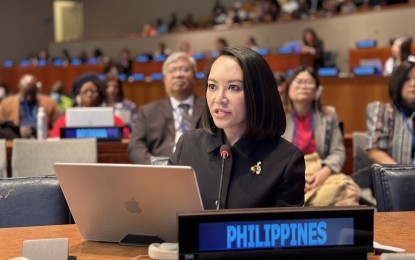
Social Welfare and Development Undersecretary Emmeline Aglipay-Villar during an interactive expert dialogue at the 68th Session of the UN Commission on the Status of Women (UN CSW68) in New York on March 18. (Photo courtesy of PCO)
MANILA – The Philippine government, through the Department of Social Welfare and Development (DSWD), reaffirmed its commitment to uplifting the lives of poor girls and women through various social protection programs.
Speaking at an interactive expert dialogue at the 68th Session of the United Nations Commission on the Status of Women (UN CSW68) in New York on Monday, DSWD Undersecretary Emmeline Aglipay-Villar said the government continues to fund such programs as part of the national strategy to eradicate poverty among women.
“By implementing a spectrum of social protection initiatives, from short to long-term support, the Philippine government effectively addresses the diverse needs of Filipino women and girls living in poverty in line with the Philippines’ strongly held position that women and girls empowerment redound to a stronger, more resilient nation for generations to come,” she said.
Among the initiatives she highlighted were the country’s multisectoral nutrition project and food stamp program to address hunger.
She also mentioned the Philippine sustainable livelihood program that support women in starting a business to growing it into formal enterprise.
In 2023 alone, she said at least 113,961 women entrepreneurs benefited from incubation services, capacity building, and livelihood grants under the five-year initiative.
The Philippines, she said, also implements the Tara, Basa! (Let's Read!) program to improve the reading and comprehension of first grade students by employing college students as tutors.
Last year, 17,314 girls and 4,289 female college students benefited from the development program.
On top of these, Villar said the country strengthens its institutions by allocating part of the national budget on gender and development.
Since 1995, the country has been implementing a women’s budget, mandating all government offices to allocate at least five percent of their budget to gender equality measures. (PNA)
